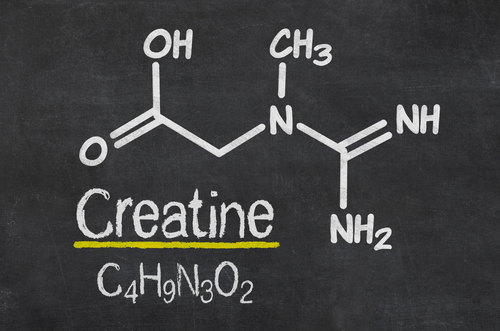Short answer
Creatine is one of the safest bodybuilding supplements when used in correct dosages (5g max recommended daily). Note that overconsumption can lead to unwanted side effects, but are usually not serious. It is also important to stay hydrated when using the supplement.
Recommended Alternative
Overall beneficial to your health. Things rated a 'B' may have some harmful qualities to pay attention to.
View Full Grading System
Category 'A'
Very healthy and numerous health benefits. Side effects are rare. Things rated an 'A+' are typically necessary for survival (for example, water).
Very healthy and numerous health benefits. A few harmful qualities may be associated, but only under certain circumstances such as an allergic reaction.
Very healthy and numerous health benefits. Harmful qualities may be associated, but aren't usually serious.
It is important to note that even the best things in life can become bad in immoderate amounts. So, although something may be rated an 'A+', overconsumption/overdoing can bring unwanted effects.
Category 'B'
Very beneficial to your health. Things rated a 'B+' may have a few harmful qualities to pay attention to.
Overall beneficial to your health. Things rated a 'B' may have some harmful qualities to pay attention to.
More beneficial to your health than not. However, harmful qualities are most likely associated and shouldn't be overlooked.
The main difference between category 'A' and category 'B' is the harmful qualities typically present in 'B' items. Serious side effects are usually uncommon, but are still possible and should be taken note of.
Category 'C'
Both beneficial and harmful qualities associated. Things rated a 'C+' are typically a bit more on the beneficial side. Still, moderation is important.
A fairly even ratio of beneficial and harmful qualities. Moderation is important. Very general topics that can lean towards both sides of the spectrum will be placed here as well. Rice, for example, can be good or bad depending on the type.
More harmful than beneficial. Side effects are common, especially when consumed/done excessively. Moderation is very important.
Category 'C' usually denotes to both good and bad qualities. When it comes to this category, it is important to keep this word in mind: moderation.
Category 'D'
Harmful to your health. Although benefits may be associated, the bad most likely outweighs the good. Moderation is very important.
Harmful to your health. A few benefits may be associated, but the bad outweighs the good. Moderation is extremely important.
Harmful to your health. Very few, if any, benefits are present. Things in this category should be avoided as much as possible.
Category 'D' is typically for things that are more harmful than beneficial. While consuming/doing something unhealthy once in a blue moon shouldn't hurt, we definitely recommend eliminating 'D' items as a regular part of your routine/diet.
Category 'F'
Category 'F' is for things that fail to bring anything beneficial to the table, and are very harmful to your health. We recommend completely avoiding anything in this category. Long-term side effects of 'F' items are usually very serious.
Category 'N'
'N' stands for neutral. Things placed into this category are generally (a) neither good nor bad for you, or (b) lack the necessary evidence to reach any conclusions.
Long answer
Aside from being a great source of energy, creatine helps to increase water retention in muscles, making them bigger and increasing their performance. This is the main motive behind its use as a fitness supplement. Creatine is naturally found in meat and is also produced in our livers and pancreases.
Creatine is one of the most widely studied supplements. Because it encourages water retention in the muscles, it can cause water to be drained from other organs, resulting in dehydration. It is claimed in some quarters that creatine use can lead to liver damage but numerous studies on humans have failed to find a correlation. A study conducted at the University of Maryland suggested potential kidney damage from a high dosage of creatine, especially in people with prior kidney conditions. Other similar studies, however, are largely in disagreement or inconclusive. The depletion of the body’s own creatine stores has also been suggested but not proven. Side effects that are proven include nausea, cramping, diarrhea, and dizziness.
Generally, you will be safe if you use the recommended dose of creatine and drink water regularly. If you have kidney / liver problems or are on medication, it is prudent to consult a physician to make sure creatine use is safe for you.
Possible short-term side effects
- nausea
-
dizziness
-
cramping
-
diarrhea
-
increased kidney workload
Possible long-term side effects
- liver damage (suggested, not proven)
Benefits
- increases water retention
-
increases athletic performance
-
increases muscle size
-
increases energy
-
boosts brain power
-
slows progression of parkinson's disease
Our Wellness Pick
(what is this?)
ON Creatine Monohydrate
- Enhances muscle strength
- Promotes workout recovery
- Keto-friendly supplement
- Unflavored versatility
- 120 servings per pack
Learn More!
Please turn your Ad Blocker off to see this content. Thank you!
Thank you for your feedback!
Written by Brendan Quigley
Published on: 12-28-2015
Last updated: 12-15-2023
Thank you for your feedback!
Written by Brendan Quigley
Published on: 12-28-2015
Last updated: 12-15-2023

 Approved by
Approved by 















